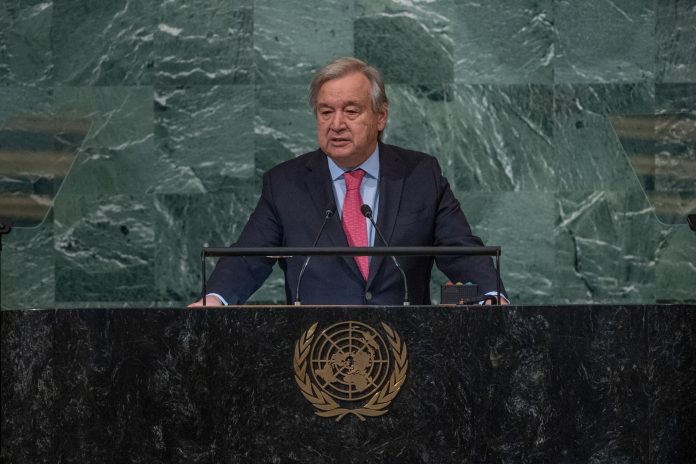The United Nations (UN) Secretary General, Antonio Guterres, warned at Davos that mankind is „looking into the eye of a Category 5 hurricane”, according to the UN official website.
Below is the full message of Antonio Guterres:
Excellencies, dear friends,
Thank you very much for your welcome and thank you, dear President Schwab, for your kind words. It is very good to be back in Davos, and once again in person.
Your theme perfectly sets out the dilemma of today’s world:
We need cooperation, yet we face fragmentation.
I am not here to sugar-coat the scale of that challenge – or the sorry state of our world.
We can’t confront problems unless we look them squarely in the eye.
And we are looking into the eye of a Category 5 hurricane.
Our world is plagued by a perfect storm on a number of fronts.
Start with the short-term, a global economic crisis.
The outlook, as we all know, is bleak.
Many parts of the world face recession and the entire world faces a slowdown.
We see deepening inequalities and a rapidly unfolding cost-of-living crisis – affecting women and girls the most.
Supply chain disruptions and an energy crunch.
Soaring prices.
Rising interest rates along with inflation.
And debt levels pounding vulnerable countries.
Add to all of that the lingering effects of the pandemic.
COVID-19 is still straining economies – whith the world’s failure to prepare for future pandemics, that failure is straining our credulity.
Somehow – after all we have endured – we have not learned the global public health lessons of the pandemic. We are nowhere near ready for the pandemics to come.
Add to all that another major and, indeed, existential challenge.
We are flirting with climate disaster.
Every week brings a new climate horror story.
Greenhouse gas emissions are at record levels and growing.
The commitment to limit global temperature rise to 1.5 degrees is nearly going up in smoke.
Without further action, we are headed to a 2.8-degree increase.
The consequences, as we all know, would be devastating. Several parts of our planet would be uninhabitable. And for many, it would mean a death sentence.
But this is not a surprise. The science has been clear for decades.
And I am not talking only about UN scientists.
I am talking even about fossil fuel scientists.
We learned last week that certain fossil fuel producers were fully aware in the 1970s that their core product was baking our planet.
And just like the tobacco industry, they rode rough-shod over their own science.
Some in Big Oil peddled the big lie.
And like the tobacco industry, those responsible must be held to account.
Today, fossil fuel producers and their enablers are still racing to expand production, knowing full well that this business model is inconsistent with human survival.
Now, this insanity belongs in science-fiction, yet we know the ecosystem meltdown is cold, hard scientific fact.
Add to this toxic brew yet another combustible factor – conflict, violence, war.
Especially the Russian invasion of Ukraine – not only because of the untold suffering of the Ukrainian people, but because of its profound global implications.
On global food and energy prices. On trade and supply chains. On questions of nuclear safety.
On the very foundations of international law and the United Nations Charter.
We are doing our best making progress where we can – particularly in facilitating exports of food and fertilizers from Ukraine and also Russia.
But we are a far cry from peace in line with international law and the United Nations Charter.
So, dear friends,
All these challenges are inter-linked.
They are piling up like cars in a chain reaction crash.
Now, let’s be clear.
It would be difficult to find solutions to these global inter-linked problems in the best of times, and in a world that would be united .
But these are far from the best of times – and the world is far from being united.
Instead, we face the gravest levels of geopolitical division and mistrust in generations – and it is undermining everything.
First, the East-West divide.
We risk what I have called the Great Fracture – the decoupling of the world’s two largest economies.
A tectonic rift that would create two different sets of trade rules, two dominant currencies, two internets and two conflicting strategies on artificial intelligence.
This is the last thing we need.
The IMF reported that dividing the global economy into two blocs could cut global GDP by a whopping $1.4 trillion.
Now, there are many aspects in which US-China relations will inevitably diverge – particularly on questions of human rights and on some areas of regional security.
But despite that, it is possible – and I would say it is essential – for the two countries to have meaningful engagement on climate, trade and technology to avoid the decoupling of economies or even the possibility of future confrontation.
For the historians that might be listening: We must avoid a 21st century sequel of the so-called Thucydides Trap.
At the same time, and secondly, the North-South divide is deepening.
I am not convinced, that the wealthier world and their leaders truly grasps the degree of frustration and even anger in the Global South.
Frustration and anger about the gross inequity of vaccine distribution in the recent past.
Frustration and anger about pandemic recovery – with support overwhelmingly concentrated in wealthier countries that could print money.
And trillions were printed in the global North, and of course developing countries could not print money because their currencies would go down the drain.
Frustration and anger about a climate crisis that is crippling countries that contributed least to global heating. And the lack of the financial resources to respond to the challenge.
Frustration and anger over a morally bankrupt financial system in which systemic inequalities are amplifying societal inequalities.
A system that is still routinely denying debt relief and concessional funding to vulnerable middle-income countries that are in desperate need. Because the rules are not made to allow it.
A system in which most of the world’s poorest countries saw their debt service payments skyrocket by 35% in the last year alone.
Now, we need to bridge all these divides and we need to restore trust.
How can we do it?
First — by reforming and building fairness into the global financial system.
Developing countries need access to finance to reduce poverty and hunger and advance the Sustainable Development Goals.
I have urged the G20 to agree on a global SDG Stimulus Plan that will provide support to countries of the Global South – including the vulnerable middle-income ones.
They need the necessary liquidity, debt relief and restructuring – as well as long-term lending – to invest in sustainable development.
In short, we need a new debt architecture.
And Multilateral Development Banks must change their business model.
Beyond their own operations, which are, of course, very important, they must concentrate on multiplying their impact, leveraging massively private finance in a systematic way, providing guarantees, accepting to be first risk-takers in coalitions of financial institutions to support developing countries.
Without creating the conditions for massive inflow of private finance at reasonable cost to the developing world, there is simply no solution. International financial institutions are too small and the capacity to increase ODA is not to be seen in the short term.
Second, bridging divides and restoring trust means meaningful climate action, and climate action now.
The battle to keep the 1.5-degree limit alive will be won or lost in this decade.
On our watch.
And right now, we have to confess that the battle is being lost.
So, we need to act together to close the emissions gap.
And that means to phase out progressively coal and supercharge the renewable revolution.
To end the addiction to fossil fuels.
And to stop our self-defeating war on nature.
On the other hand, the developed world must finally deliver on its $100 billion climate finance commitment to support developing countries.
Adaptation finance must be doubled, as it was promised in Sharm El-Sheikh.
And the biggest emitters – namely the G20 countries – must unite around a Climate Solidarity Pact in which they make extra efforts in the 2020s to keep the 1.5-degree limit alive.
And it doesn’t work if developed countries attribute responsibility to emerging economies, and emerging economies attribute responsibility to developed countries. They need to come together, to bring together all their capacities – financial and technological – with the developed ones providing financial and technical assistance to help the major emerging economies accelerate their renewable energy transition.
Because, if they don’t, we will not be able to reduce emissions at the level that is necessary to keep the 1.5 degree goal – I would say to keep the 2-degree goal alive.
But our climate goals need the full engagement of the private sector.
The truth is that more and more businesses are making net zero commitments.
But benchmarks and criteria are often dubious or murky.
This can mislead consumers, investors and regulators with false narratives.
And it feeds a culture of climate misinformation and confusion, and leaves the door open to greenwashing.
That is why we created an Expert Group on Net-Zero Emissions Commitments. Recently the group has issued a how-to guide for credible, accountable net-zero pledges.
Here at Davos, I call on all corporate leaders to act based on these guidelines.
To put forward credible and transparent transition plans on how to achieve net zero – and to submit those plans before the end of this year.
Now, the transition to net zero must be grounded in real emissions cuts – and not relying essentially on carbon credits or shadow markets.
And, finally, what is true about private sector engagement on climate applies across a range of challenges.
Government action is critical – even if obviously it’s not enough.
We must find avenues to boost the private sector’s ability to play its full role for good.
And it must be recognized that, in many ways, the private sector today is leading, but it is, to a certain extent, undermined by government action, or the lack of government action.
Governments need to create the adequate regulatory and stimulus environments to support the private sector instead of maintaining rules, subsidies, and other forms of action that undermine the efforts of the private sector to move forward in climate action
And business models and practices must be reworked to advance the Sustainable Development Goals.
Without creating the conditions for the massive engagement of the private sector, it will be impossible to move from the billions to trillions that are needed to achieve the SDGs.
To lead the way to expand economic opportunity for women.
To ensure greater engagement and cooperation for vaccine equity.
To achieve global food security.
And for that, we need the cooperation of the private sector to keep Ukrainian and Russian food and fertilizer exports flowing and affordable.
Even in the midst of the war, the insurance sector has helped support the movement of vessels from Ukraine and Russia.
We urgently need other private sector actors to engage, such as the banking sector, the traders, and the shippers.
Across the spectrum of global challenges, we need private sector resourcefulness and cooperation to be able to advance in our common objectives of peace, sustainable development and human rights.
So, excellencies and dear friends,
There are no perfect solutions in a perfect storm.
But we can work to control the damage and to seize the opportunities available.
Now more than ever, it’s time to forge the pathways to cooperation in our fragmented world. To adopt multilateral institutions, to bring trust to where trust is badly needed, because the world cannot wait.
Thank you.




